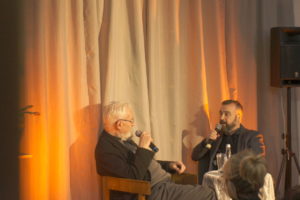March 1. Priest Adam Boniecki: ‘March 1968’
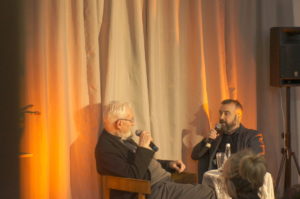 Priest Adam Boniecki was greeted by a large audience with a standing ovation. The talk with editor-in-chief of Tygodnik Powszechny weekly, led by Bogdan Białek, focused on events of March 1968. As emphasised by Białek it was an issue which Boniecki did not discuss in public, hence the special character of the meeting. The longest part of the meeting was devoted to the discussion with the audience. Questions asked by our guests related mostly to the current situation of Poland and the Church. The answers given by Boniecki were full of hope, however, it did not mean that he failed to notice and acknowledge current problems.
Priest Adam Boniecki was greeted by a large audience with a standing ovation. The talk with editor-in-chief of Tygodnik Powszechny weekly, led by Bogdan Białek, focused on events of March 1968. As emphasised by Białek it was an issue which Boniecki did not discuss in public, hence the special character of the meeting. The longest part of the meeting was devoted to the discussion with the audience. Questions asked by our guests related mostly to the current situation of Poland and the Church. The answers given by Boniecki were full of hope, however, it did not mean that he failed to notice and acknowledge current problems.
(There were approximately 100 participants at the Institute and 1.3 thousand webcast views).
March 2. Professor Andrzej Friszke and journalist Seweryn Blumsztajn ‘March Events: Jewish history or the history of Polish intelligentsia?’
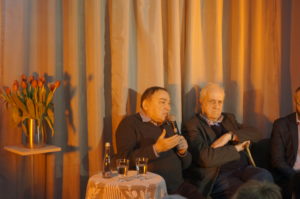 During the second day of the festival we continued the discussions on the events of March 1968. Our guests included journalist Seweryn Blumsztajn, who participated in those events, and professor Andrzej Friszke, historian who conducted analyses of the events. Bumsztajn indicated three layers of March 1968: the anti-Semitic campaign, student strikes and tensions in the ruling camp. On the other hand, professor Friszke explained several myths related to March 1968. He also spoke about the conflict within the Polish Communist Party and how stirring-up anti-Semitic sentiments was treated instrumentally.
During the second day of the festival we continued the discussions on the events of March 1968. Our guests included journalist Seweryn Blumsztajn, who participated in those events, and professor Andrzej Friszke, historian who conducted analyses of the events. Bumsztajn indicated three layers of March 1968: the anti-Semitic campaign, student strikes and tensions in the ruling camp. On the other hand, professor Friszke explained several myths related to March 1968. He also spoke about the conflict within the Polish Communist Party and how stirring-up anti-Semitic sentiments was treated instrumentally.
(Approximately 80 participants at the Institute and 700 webcast views).
March 3. Wojciech Tochman: ‘On Escaping’
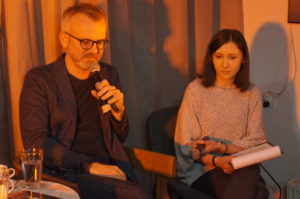 The meeting concerned issues discussed by the journalist, namely the genocide in Bosnia and Rwanda, refugee issues as well as responsibility for the heroes, whose lives are described. Readers could also learn more about a project on the mentally ill inhumanely treated by their relatives, on which Tochman had been working in Phnom Pen. Tochman also spoke about Lidia Ostałowska, an extraordinary reporter, who died in January that year.
The meeting concerned issues discussed by the journalist, namely the genocide in Bosnia and Rwanda, refugee issues as well as responsibility for the heroes, whose lives are described. Readers could also learn more about a project on the mentally ill inhumanely treated by their relatives, on which Tochman had been working in Phnom Pen. Tochman also spoke about Lidia Ostałowska, an extraordinary reporter, who died in January that year.
(Approximately 50 people at the Institute and 600 webcast views).
March 4. Concert by Joanna Trzepiecińska ‘Jak wybrnąć z gafy’
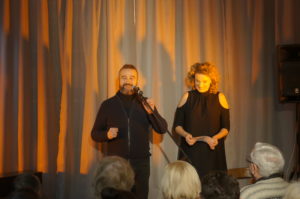 A festiwal Sunday was the time of relaxation and a break from difficult topics. Therefore, at the Institute for the Culture of Encounter and Dialogue we organized a concert of Joanna Trzepiecińska accompanied by Bogdan Hołownia. Notable artists prepared a recital consisting of songs from the repertoire of interpretations of Julian Tuwim, marian hemar or Jerzy Łazowski poems.
A festiwal Sunday was the time of relaxation and a break from difficult topics. Therefore, at the Institute for the Culture of Encounter and Dialogue we organized a concert of Joanna Trzepiecińska accompanied by Bogdan Hołownia. Notable artists prepared a recital consisting of songs from the repertoire of interpretations of Julian Tuwim, marian hemar or Jerzy Łazowski poems.
(Approximately 60 participants at the Institute).
March 5. Jerzy Trela reads Herbert and Miłosz
The works of outstanding poets interpreted by the Master. Jerzy Trela recited, among others, ‘Two Drops’, ‘To Marcus Aurelius’, ‘At the gate of the Valley’, ‘Mr. Cogito Seeks Advice’, or Herbert’s ‘Campio di Fiori’, ‘Poor Christian Looks at the Ghetto’ and Miłosz’s ‘To a politician’.
(Approximately 80 participants at the Institute)
March 5. ‘Pod klątwą. Portret społeczny pogrom kieleckiego’ [Cursed. Social portrait of the Kielce pogrom] – a premiere of a book by Joanna Tokarska-Bakir
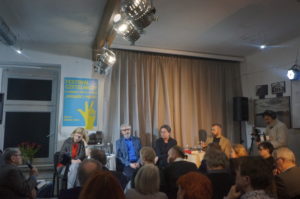 The panel discussion devoted to the book entitled ‘Pod klątwą. Portret społeczny pogrom kieleckiego’ [Cursed. Social portrait of the Kielce pogrom] involved the author of the book, Joanna Tokarska-Bakir, Professor Bożena Szajnok (historian from Wrocław University), Professor Jacek Leonciak (literary critic, literary historian, Institute for Literary Research of the Polish Academy of Sciences and the Centre for Holocaust Research of the Polish Academy of Sciences), Professor Irena Grudzińska-Gross (historian of ideas, Boston University), Helena Datner, PhD (historian, sociologist, the Jewish Historical Institute), Professor Alina Skibińska (historian, Centre for Holocaust Research of the Polish Academy of Sciences, an associate of the United States Holocaust Memorial Museum), Marek Maciągowski, PhD (historian, director of the Centre for Patriotic and Civic Thought in Kielce) and Jaroslaw Dulewicz, PhD, (historian, associate of the Institute of Yad Vashem and the United States Holocaust Memorial Museum).
The panel discussion devoted to the book entitled ‘Pod klątwą. Portret społeczny pogrom kieleckiego’ [Cursed. Social portrait of the Kielce pogrom] involved the author of the book, Joanna Tokarska-Bakir, Professor Bożena Szajnok (historian from Wrocław University), Professor Jacek Leonciak (literary critic, literary historian, Institute for Literary Research of the Polish Academy of Sciences and the Centre for Holocaust Research of the Polish Academy of Sciences), Professor Irena Grudzińska-Gross (historian of ideas, Boston University), Helena Datner, PhD (historian, sociologist, the Jewish Historical Institute), Professor Alina Skibińska (historian, Centre for Holocaust Research of the Polish Academy of Sciences, an associate of the United States Holocaust Memorial Museum), Marek Maciągowski, PhD (historian, director of the Centre for Patriotic and Civic Thought in Kielce) and Jaroslaw Dulewicz, PhD, (historian, associate of the Institute of Yad Vashem and the United States Holocaust Memorial Museum).
(Approximately 100 participants at the Institute and 1.2 thousand webcast views)
March 6. Sabina Baral ‘Zapiski z wygnania’ [Records from the Exile]
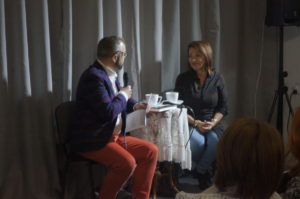 Our guest was Sabina Baral, author of the book entitled ‘Zapiski z wygnania’ [Records from the Exile], who in 1968 had to leave Poland, leaving behind her entire life. She spoke about her youth, a sense of sorrow and grief, waiting for apologies from Poland and the need to look for former friends.
Our guest was Sabina Baral, author of the book entitled ‘Zapiski z wygnania’ [Records from the Exile], who in 1968 had to leave Poland, leaving behind her entire life. She spoke about her youth, a sense of sorrow and grief, waiting for apologies from Poland and the need to look for former friends.
(Approximately 60 participants at the Institute and 500 webcast views)
March 12. Andrzej Franaszek. ‘Miłosz and Herbert – a dispute about Poland and patriotism’
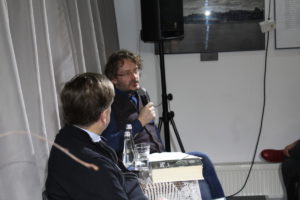 Andrzej Franaszek, with extraordinary literary sensitivity talked about the friendship of Czesław Miłosz and thirteen years younger Zbigniew Herbert. Anecdotal narrative allowed to avoid pathos, while showing many dramas that filled the lives of the two poets. During the meeting, Franaszek presented the sources of the conflict which led to the disagreement between Herbert and Miłosz in spring 1968.
Andrzej Franaszek, with extraordinary literary sensitivity talked about the friendship of Czesław Miłosz and thirteen years younger Zbigniew Herbert. Anecdotal narrative allowed to avoid pathos, while showing many dramas that filled the lives of the two poets. During the meeting, Franaszek presented the sources of the conflict which led to the disagreement between Herbert and Miłosz in spring 1968.
(Approximately 80 participants at the Institute and 600 webcast views)
March 13. Professor Dariusz Doliński ‘As real as the so-called life gets’ Professor focused on conclusions
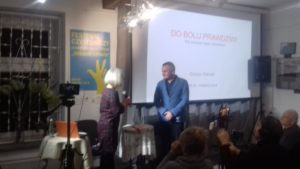 Professor Doliński spoke about the Miligram experiment which showed how strong the mechanism of blind obedience is. He spoke about the experiment conducted in America in 1991 – its history, procedure and outcomes as well as his own narrative concerning the experiment which he conducted together with Tomasz Grzyb, PhD, in 2017 in Wroclaw. The Professor focused on conclusions resulting from the experiment that explain our nature.
Professor Doliński spoke about the Miligram experiment which showed how strong the mechanism of blind obedience is. He spoke about the experiment conducted in America in 1991 – its history, procedure and outcomes as well as his own narrative concerning the experiment which he conducted together with Tomasz Grzyb, PhD, in 2017 in Wroclaw. The Professor focused on conclusions resulting from the experiment that explain our nature.
(Approximately 80 participants at the Institute and 600 webcast views)
March 15. Justyna Dąbrowska and Magdalena Tulli “Jaka iękna iluzja” [What a Beautiful Illusion]
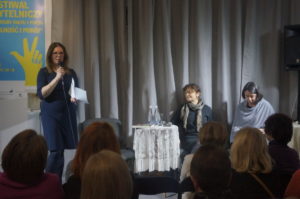 The book entitled “Jaka piękna iluzja” [What a Beautiful Illusion] is a very personal record of a talk between women. During the meeting, Magdalena Brzezińska talked with the authors about writing, everyday life and difficult emotions and also about what to do to change an interview into a meeting that would encourage us to open up and also look into one’s own inner self.
The book entitled “Jaka piękna iluzja” [What a Beautiful Illusion] is a very personal record of a talk between women. During the meeting, Magdalena Brzezińska talked with the authors about writing, everyday life and difficult emotions and also about what to do to change an interview into a meeting that would encourage us to open up and also look into one’s own inner self.
(Approximately 60 participants at the Institute and 500 webcast views)
March 16. Mikolaj Grynberg and his latest book about March 1968 entitled ‘Księga Wyjścia’ [The Book of Exodus]
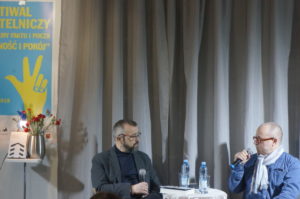 In winter atmosphere, we organized a meeting with Mikołaj Grynberg, a psychologist, photographer and the author of the books entitled ‘Ocaleni z XX wieku’ [Survivors from the 20th Century] and ‘Oskarżam Auschwitz’ [I Accuse Auschwitz]. It was another talk about March 1968 and about the fates of people who were to leave Poland.
In winter atmosphere, we organized a meeting with Mikołaj Grynberg, a psychologist, photographer and the author of the books entitled ‘Ocaleni z XX wieku’ [Survivors from the 20th Century] and ‘Oskarżam Auschwitz’ [I Accuse Auschwitz]. It was another talk about March 1968 and about the fates of people who were to leave Poland.
(Approximately 70 participants at the Institute and 620 webcast views)
March 19. Professor Jan Andrzej Kłoczkowski, OP “The First Testament – the Alien, the Other, the Known’
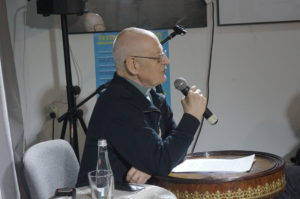 A lecture conducted by a theologian, art historian and philosopher revolving around the philosophy of dialogue, the Other and accepting the Other in everyday life as well as about otherness which is often the reason for exclusion. In his lecture, a well-known Krakow priest referred to a vision from the Old Testament that has penetrated Christianity.
A lecture conducted by a theologian, art historian and philosopher revolving around the philosophy of dialogue, the Other and accepting the Other in everyday life as well as about otherness which is often the reason for exclusion. In his lecture, a well-known Krakow priest referred to a vision from the Old Testament that has penetrated Christianity.
(Approximately 80 participants at the Institute and 550 webcast views)
March 20. Screening of the film entitled ‘Ptaki śpiewają w Kigali’ [Birds Sing in Kigali] and a meeting with the film director Joanna Kos-Krauze
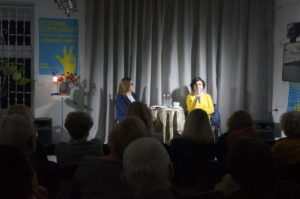 The film ‘Ptaki śpiewają w Kigali’ [Birds Sing in Kigali] directed by Joanna Kos-Krauze is a story about friendship and the tragedy of genocide against Tutsi in 1994. Joanna Kos-Kraze spoke about her working on the film and her experiences connected with her life in Africa. She pointed to the political and social background of the mass slaughter of Tutsi and described the consequences which still effect residents of Rwanda, especially a dramatic situation in which victims and executioners live side by side. She also drew attention to symbols presented in the film and explained the process of creating it.
The film ‘Ptaki śpiewają w Kigali’ [Birds Sing in Kigali] directed by Joanna Kos-Krauze is a story about friendship and the tragedy of genocide against Tutsi in 1994. Joanna Kos-Kraze spoke about her working on the film and her experiences connected with her life in Africa. She pointed to the political and social background of the mass slaughter of Tutsi and described the consequences which still effect residents of Rwanda, especially a dramatic situation in which victims and executioners live side by side. She also drew attention to symbols presented in the film and explained the process of creating it.
(Approximately 80 participants at the Institute and 800 webcast views)
March 21. Adam Zagajewski “Poezja dla początkujących’ [Poetry for Beginners]
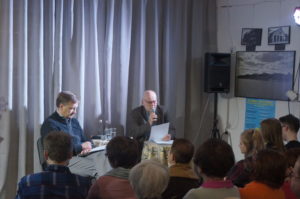 “Poezja dla początkujących’ [Poetry for Beginners] is the title of the latest volume of poems by Zagajewski in which the author speaks about important artists of the 20th century (Czapski, Herbert, Kawafis, Kornhauser, Mann, Milosz, Rilke, Sebald, Szymborska) and asks questions related to the responsibilities of the poet and the functioning of the artist in the modern world. He also explains how and why one should read his poems. The discussion about the origin of the poems was conducted by Piotr Żak.
“Poezja dla początkujących’ [Poetry for Beginners] is the title of the latest volume of poems by Zagajewski in which the author speaks about important artists of the 20th century (Czapski, Herbert, Kawafis, Kornhauser, Mann, Milosz, Rilke, Sebald, Szymborska) and asks questions related to the responsibilities of the poet and the functioning of the artist in the modern world. He also explains how and why one should read his poems. The discussion about the origin of the poems was conducted by Piotr Żak.
(Approximately 70 participants at the Institute and 350 webcast views)
March 22. Professor Adam Strzembosz and Stanisław Zakroczymski “Między prawem a sprawiedliwością‘ [Between Law and Justice]
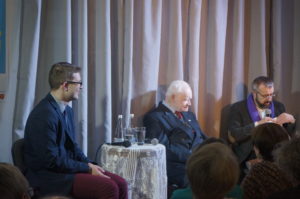 The discussion revolved around the book entitled “Między prawem a sprawiedliwością‘ [Between Law and Justice], an extended interview with Professor Adam Strzembosz in which he spoke about a political-legal dispute that had divided Poland and also about the history of political transformations.
The discussion revolved around the book entitled “Między prawem a sprawiedliwością‘ [Between Law and Justice], an extended interview with Professor Adam Strzembosz in which he spoke about a political-legal dispute that had divided Poland and also about the history of political transformations.
(Approximately 100 people present at the Institute and 400 webcast views)
March 24. Professor Bogdan de Barbaro ‘Who Has Become Crazy Here?’
One of the most important challenges that everyone faces is an attempt to answer the question of Who is the Other for me? Professor de Barbaro, a psychiatrist and therapist, professor of medicine at the Jagiellonian University, author of numerous publications concerning, among others, family therapy and schizophrenia, tried to answer the question.
(Approximately 70 participants at the Institute and 400 webcast views)
March 26. Anna Bikont: ‘Sendlerowa. W ukryciu’ [Sendlerowa. In Secret]
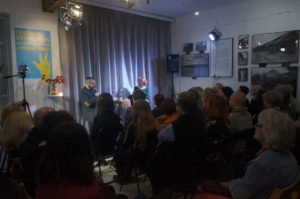 During the talk with Bogdan Białek, the author spoke about her latest book according to which Sendlerowa is not a sweet martyr that does not know her name but a leftist choleric who could not stand stupidity and meanness and therefore decided to help Jews during the war.
During the talk with Bogdan Białek, the author spoke about her latest book according to which Sendlerowa is not a sweet martyr that does not know her name but a leftist choleric who could not stand stupidity and meanness and therefore decided to help Jews during the war.
(Approximately 80 people present at the Institute and 1,100 webcast views)
The festival was attended by approximately 1,300 spectators directly, and even twice as much, if we add surfers watching live broadcasts online. Many people watched the broadcast after the festival finished (we had more than 10,000 views).






